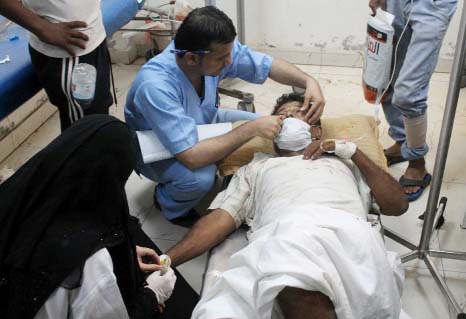
AFP, Dubai :
The Saudi-led coalition has been using US-supplied cluster bombs in its air camppaign against Yemeni rebels, Human Rights Watch said on Sunday, warning of the long-term dangers to civilians.
The widely banned munitions contain dozens of submunitions, which sometimes do not explode, becoming de facto landmines that can kill or maim long after they were dropped.
HRW said it had gathered photographs, video and other evidence indicating that cluster munitions had been used in coalition air strikes against the Houthi rebel stronghold of Saada province in Yemen’s northern mountains.
It said that analysis of satellite imagery suggested that the weapons had landed on a cultivated plateau, within 600 metres (yards) of populated areas.
Cluster munitions are prohibited by a 2008 treaty adopted by 116 countries, but not by Saudi Arabia and its coalition partners or the United States.
“Saudi-led cluster munition air strikes have been hitting areas near villages, putting local people in danger,” said HRW arms director Steve Goose.
“Saudi Arabia and other coalition members, and the supplier, the US, are flouting the global standard that rejects cluster munitions because of their long-term threat to civilians.
“HRW said that the munitions used in Yemen appeared to be the CBU-105 Sensor Fuzed Weapons manufactured by the Textron Systems Corporation and supplied to both Saudi Arabia and the United Arab Emirates by the United States in recent years.
The weapon is banned by the Convention on Cluster Munitions but Washington permits its use and export because it boasts an unexploded ordnance rate of less than one per cent.
Meanwhile, Iran’s Deputy Foreign Minister said Tehran will not let regional powers jeopardise its security interests in Yemen, Tasnim news agency reported, in the strongest acknowledgement yet of Iranian involvement in the Arabian peninsula.
Iran has denied accusations from Western and Arab states that it is arming Shi’ite Muslim Houthi rebels in Yemen, though a UN sanctions monitoring panel revisited those allegations in a confidential report this week. Tehran has regularly condemned a Saudi-led air campaign against the insurgents.
“Others will not be allowed to put our shared security at risk with military adventures,” Hossein Amir Abdollahian said, according to the Iranian Tasnim news agency in an article published on Saturday.
Saudi Arabia, which sees itself as the guardian of Sunni Islam, has long vied for influence with Iran, the region’s main Shi’ite Muslim power.
The Saudi-led coalition has been carrying out air strikes in Yemen since late March against the Houthis and their allies, whose rapid advances forced Yemeni President Abd-Rabbu Mansour Hadi and his government into exile in Riyadh.
Iran does not recognise Hadi and has portrayed the air strikes as an intervention in Yemen’s internal affairs.
Earlier this week, Saudi Arabia said coalition jets destroyed the runway of Yemen’s Sanaa airport to prevent an Iranian cargo plane from landing there.
The Saudi-led coalition has been using US-supplied cluster bombs in its air camppaign against Yemeni rebels, Human Rights Watch said on Sunday, warning of the long-term dangers to civilians.
The widely banned munitions contain dozens of submunitions, which sometimes do not explode, becoming de facto landmines that can kill or maim long after they were dropped.
HRW said it had gathered photographs, video and other evidence indicating that cluster munitions had been used in coalition air strikes against the Houthi rebel stronghold of Saada province in Yemen’s northern mountains.
It said that analysis of satellite imagery suggested that the weapons had landed on a cultivated plateau, within 600 metres (yards) of populated areas.
Cluster munitions are prohibited by a 2008 treaty adopted by 116 countries, but not by Saudi Arabia and its coalition partners or the United States.
“Saudi-led cluster munition air strikes have been hitting areas near villages, putting local people in danger,” said HRW arms director Steve Goose.
“Saudi Arabia and other coalition members, and the supplier, the US, are flouting the global standard that rejects cluster munitions because of their long-term threat to civilians.
“HRW said that the munitions used in Yemen appeared to be the CBU-105 Sensor Fuzed Weapons manufactured by the Textron Systems Corporation and supplied to both Saudi Arabia and the United Arab Emirates by the United States in recent years.
The weapon is banned by the Convention on Cluster Munitions but Washington permits its use and export because it boasts an unexploded ordnance rate of less than one per cent.
Meanwhile, Iran’s Deputy Foreign Minister said Tehran will not let regional powers jeopardise its security interests in Yemen, Tasnim news agency reported, in the strongest acknowledgement yet of Iranian involvement in the Arabian peninsula.
Iran has denied accusations from Western and Arab states that it is arming Shi’ite Muslim Houthi rebels in Yemen, though a UN sanctions monitoring panel revisited those allegations in a confidential report this week. Tehran has regularly condemned a Saudi-led air campaign against the insurgents.
“Others will not be allowed to put our shared security at risk with military adventures,” Hossein Amir Abdollahian said, according to the Iranian Tasnim news agency in an article published on Saturday.
Saudi Arabia, which sees itself as the guardian of Sunni Islam, has long vied for influence with Iran, the region’s main Shi’ite Muslim power.
The Saudi-led coalition has been carrying out air strikes in Yemen since late March against the Houthis and their allies, whose rapid advances forced Yemeni President Abd-Rabbu Mansour Hadi and his government into exile in Riyadh.
Iran does not recognise Hadi and has portrayed the air strikes as an intervention in Yemen’s internal affairs.
Earlier this week, Saudi Arabia said coalition jets destroyed the runway of Yemen’s Sanaa airport to prevent an Iranian cargo plane from landing there.

